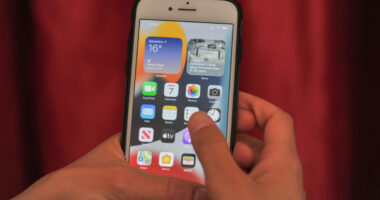
Anticipating the start of a fun event like a holiday can make it feel like it is nearly over as soon as the actual event begins, according to a study into the perception of time.
Four independent studies published in the Journal of Consumer Psychology found that anticipation and excitement had an impact on perception of time.
One study saw 451 volunteers asked to consider the upcoming weekend and whether it would be ‘fun, terrible or ‘just ok,’ then indicate how far away the start and then end of the weekend felt on a scale of zero to 100.
Volunteers said that positive events felt farther away and shorter in duration than negative events, the Ohio State University researchers discovered.
This suggests that our perception of time is linked to our anticipation of an event.


Anticipating the start of a fun event like a holiday can make it feel like it is nearly over as soon as the actual event begins, according to a study into the perception of time
The authors of the study found that when you combine the fact good events seemed farther away but over more quickly, it ‘created a strange effect’.
This was particularly the case when someone was looking forward to a holiday or other positive event.
Selin Malkoc, co-author of the study said the seemingly endless wait for a holiday to begin, combined with the feeling ‘time will fly’ when it actually begins, leads to strange perception of timings.
‘People feel like the beginning and the end of their time off are similarly far from the present,’ Malkoc said.
‘In other words, in their mind’s eye, the vacation is over as soon as it begins. It has no duration,’ despite how long it may actually last in real time.
This phenomenon has another interesting effect, the authors said.
It leads people to feel like the endpoints of positive and negative events are about the same distance from the present.
Basically if it is only Wednesday and you are expecting a boring weekend, it will feel like it comes around quickly but will last a long time when it arrives.
In contrast, if it is Wednesday and you have something planned for the weekend you are looking forward to, it will feel like the weekend is ages away, but that Monday will come around fast.
That’s because anticipating a negative event – like a dreaded work trip, dentist appointment or sad occasion – reverses the effects of a positive event.
‘Thinking about future positive and negative events leads people to take two different paths to the same conclusion,’ said co-author Gabriela Tonietto of Rutgers Business School.
In fact, 46 per cent of participants said the positive weekend felt like it had no duration at all as they thought about both the event and the time leading up to it.
Thinking about how far the beginning and the end of the event is from the present is key to this phenomenon, Malkoc said.
The Journal of Consumer Psychology paper included four related studies that came to similar conclusions – that positive events were over more quickly.


Four independent studies published in the Journal of Consumer Psychology found that anticipation and excitement had an impact on perception of time
In a related study in the same journal the authors asked volunteers to directly say how long they expected a positive weekend to last – rather than just rank on a scale of zero to 100 how far away they thought it felt from the present.
They thought it would go quickly, but they did indicate it would take up some time.
It was only when people also considered the time leading up to the fun event – which they expected to crawl – that they thought a future positive experience would feel like it had no duration.


One study saw 451 volunteers asked to consider the upcoming weekend and whether it would be ‘fun, terrible or ‘just ok,’ then indicate how far away the start and then end of the weekend felt on a scale of zero to 100
These findings have some interesting implications as people start planning vacations and other fun events as the COVID-19 pandemic ends, Malkoc said.
‘If a vacation seems like it is going to end as soon as it begins, it may make people less likely to plan specific events during their time off,’ she said.
‘It may also lead people to spend more on hotels and other luxuries, since it seems like the vacation is such a short time anyway.’
The study was published in the Journal of Consumer Psychology.









